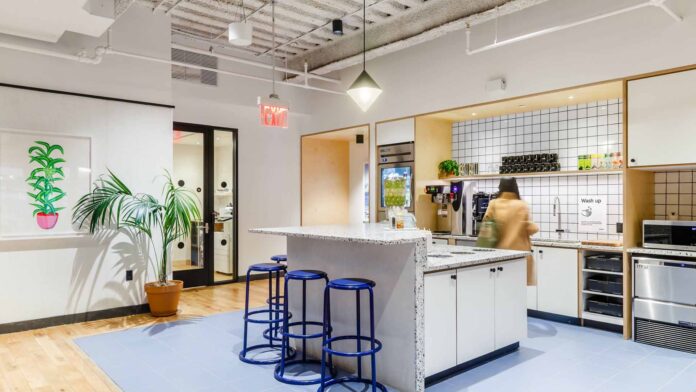WeWork, the world’s leading provider of flexible workspaces, recently introduced Elizabeth Fuller, WeWork’s Head of Growth in Southeast Asia, through a virtual roundtable with media around the region. Fuller shared the need for businesses to build an agile real estate portfolio to support an evolving workforce, and WeWork’s expertise in workspace strategy helping enterprises to future-proof their business ahead.

Amidst the pandemic’s varied impact across all industries, businesses are prioritizing workspace strategy as they advance ahead. As Manila continues to be under community quarantine, more companies have started revisiting their workspace plans. This is in response to remote work as an unsustainable solution for the long term, and employees are still seeking to connect, collaborate, and innovate. Across industries, employees want options and flexibility of choice.
“With the Philippines a key driver of the Southeast Asia economy as well as a key market for WeWork, there is greater urgency for companies to drive business sustainability beyond the pandemic. The current economic landscape provides opportunities for organizations to drive greater focus on being more dynamic with their workspace strategy. Partnering with WeWork will help businesses streamline their management of cost, operational efficiencies and employee experience to cater to an evolving workforce,” shared Elizabeth Laws Fuller, Head of Growth for WeWork Southeast Asia.
Greater urgency to recognize workplace strategy core to businesses
Many essential services such as financial, healthcare, education, and pharmaceutical needed some form of physical presence for business operations and continuity at the start of the pandemic. Slow internet speeds, inflexible spatial layouts, and restrictions on traditional leases were challenges that WeWork’s flexible workspace immediately addressed. Businesses thus turned to WeWork for its flexibility, its ability to provide additional space for de-densification to support a distributed workforce, and supporting their need for business continuity.

As the pandemic continued, savvier companies prioritized more flexibility and options to align with the economic changes and support their evolving workforce. As the economic impact of the pandemic became evident and companies looked towards 2021 and beyond, WeWork saw two major trends emerge:
1. Growth: sectors such as education and pharmaceutical experienced strong demand accelerated by COVID-19 and scaled their operations which in turn saw additional space needs.
2. Recalibration: Some sectors were greatly impacted and their focus was on consolidating and scaling down their teams and space needs. WeWork’s flexibility meant it could support those needs while giving them confidence they could expand again with WeWork in the future.
Future proofing and the evolvement of workspace needs
In planning ahead for 2021 and beyond, businesses are emphasizing cash flow management and flexibility to address the opportunities during the recovery phase and mitigate challenges when the economy declines. There is a greater need for more flexible contracts as opposed to traditional longer term leases against a volatile climate, and an urgency for companies to integrate flexible workspace.

With employee health as organizational priority, businesses have changed their space requirements and have included WeWork’s flexible workspace options in their business maintenance and continuity plan.
With flexibility of time and space determining a company’s future workspace strategy, WeWork has seen enterprises shifting towards new workspace models to support an evolving workforce. Single location fixed office spaces with dedicated desks no longer work: savvier companies know they need to support a future that demands more flexibility in where, when and how they work. A hub-and-spoke model, with a collaborative HQ, distributed offices and the option for team members to work from home and have flexible access to spaces citywide is increasingly becoming preferred for enterprises.
Enhanced optionality supporting the future of workforce
In addition to changing enterprise behaviors, WeWork is providing enhanced optionality with two new product offerings to be rolled out across Southeast Asia this year.
1. WeWork All Access: Already rolled out in Southeast Asia, this allows a member to access any of WeWork’s locations around the world with advanced booking and reservation. WeWork’s scale gives members the option to choose a convenient location for work.
2. WeWork On Demand: To be rolled out by Q1 2021, this offers non-members the option to book workspace or conference rooms at WeWork by the hour or day.
As part of WeWork’s ongoing commitment to health and safety, the company rolled out its Future of Work plan last April 2020 in the Philippines and around the world. This outlined professional distancing and increased sanitization measures, as well introduced behavioural signage in spaces. Recognizing the importance of safety and confidence for businesses and teams returning to offices, WeWork was recently awarded a Global Certificate of Conformity by Bureau Veritas.
Since entering Southeast Asia in 2017, WeWork has grown to 31 locations across six markets, all located in Grade A buildings and key districts. Locally, WeWork’s competitive edge from its expertise, flexibility, inventory and design is testament to its value proposition even as the real estate industry evolves. Together with strong membership growth in the Philippines, WeWork’s focus on its member-first approach will continue enabling them as the leading space-as-a-service provider in the country.






